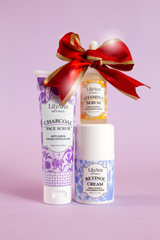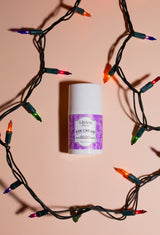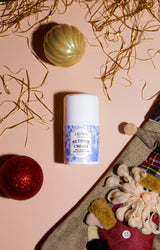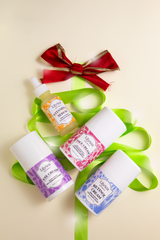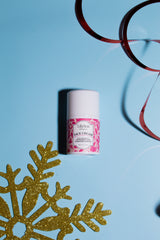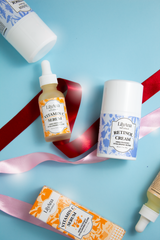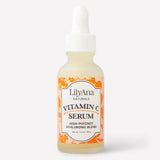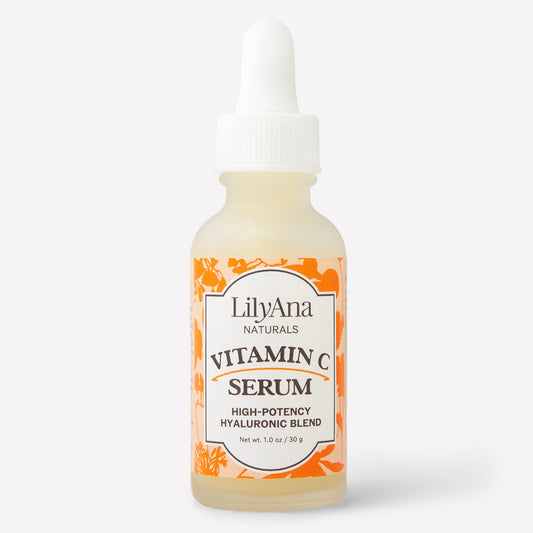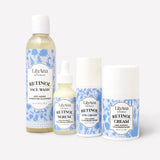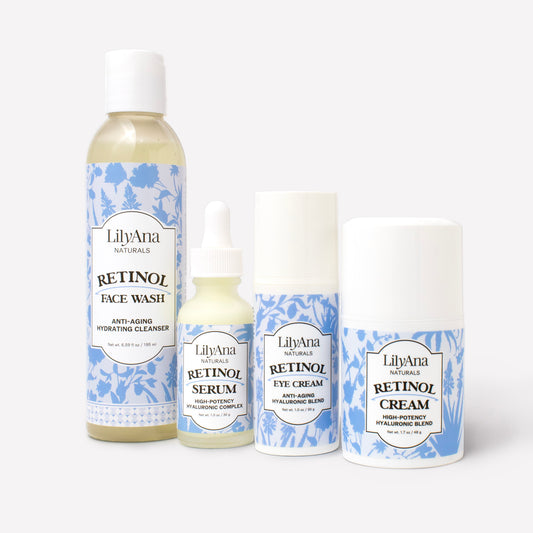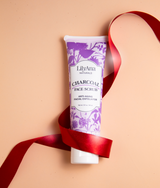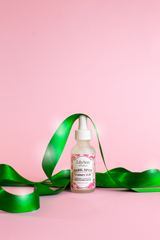Soaking in a soothing bath, check. Candles lit, check. Your favorite tunes on shuffle, check. And now for one of the ultimate gestures of self-care: a face mask.
Not only does applying a face mask allow you to pamper your skin, but it also provides loads of benefits. In this article, we will explore all types of face masks and how they can benefit your skin.

Face Mask Benefits
Face masks give your skin an instant boost to bring out your natural beauty. Although their effects may not be as long-lasting as your daily skin care regime, they can be perfect before an important event or simply to show yourself some love.
Depending on your skin’s needs, face masks can give you one or more of the following benefits:
- Soothe breakouts and inflammation
- Brighten dark spots and pigmentation
- Hydration and moisturization of dry skin
- Minimize the appearance of pores
- Smooth rough skin
- Absorb oil and dirt
- Unclog pores
- Increase elasticity
- Smooth the appearance of fine lines and wrinkles
- Even skin tone
- Cleanse deeply
Face Masks Depending on Skin Care Concerns
There are so many kinds of face masks out there, it can be confusing picking just the right one for you. Here we will make it easy for you. Simply identify the need for your skin concern, and we can recommend what kind of face mask will benefit you most.
Dry and Dehydrated Skin
Sometimes a great moisturizer is not enough. Face masks can douse your skin with just the right ingredients to help your body lock in and retain moisture. Give your dry or dehydrated skin what it needs:
- To hydrate: If your skin is dehydrated, a hydrating mask can help your skin absorb more moisture. Hyaluronic acid traps water against the skin’s surface. Using a thick cream, sheet, or peel-off mask with hyaluronic acid can allow your skin to retain every drop of precious moisture. Or try our relaxing Lavender Face Mask. Packed with hydrating aloe vera, this dreamy botanical face mask will give your skin all the moisture it has been craving. It works perfectly when paired with our Charcoal Face Scrub to allow for smooth, supple skin.
-
To moisturize: People with dry skin type are lacking natural oils. This makes it necessary to choose a face mask that can supply the skin with the oil it needs. Try an overnight shea butter mask to allow the natural moisture to fully permeate and protect the surface layer of your skin. Avocado masks also work wonders to soften, smooth and nourish.
Acne and Inflammation
Breakouts happen to the best of us. Caused by excess oil and clogged pores, these breakouts can be treated with the right mask targeting your skin care concerns. If you have severe acne, however, you may need more specialized treatment recommended by your dermatologist.
But for mild acne issues, try a face mask in combination with your targeted skin care routine. Facial masks are not to be used as a permanent solution for the problem, but as a way to ease the inflammation you have. It may also help prevent future breakouts.
-
To unclog pores: Using a DIY mask with natural ingredients like yogurt, or papaya can help get rid of the dead skin buildup that can cause acne.
-
To soothe inflammation: Oatmeal, raw honey, and aloe vera are ingredients that can help calm the skin, alleviating inflamed skin.
- To soak up oil: Charcoal masks are made of activated charcoal, which is used in the medical field to absorb toxins in the body. For this reason, it has been surmised that charcoal masks remove the toxins from your skin that create excess oil and acne. Clay masks are mineral-rich and can absorb excess oils that characterize oily and acne-prone skin.
Dark Spots and Pigmentation
Hyperpigmentation occurs when patches of skin are darker than the skin around it. This is due to excess melanin which has formed deposits after acne, age, or sun damage. Luckily, tons of face masks can help with that!
-
To brighten complexion: Use a mask containing ingredients like turmeric, aloe vera, vitamin C, or licorice root to lighten dark blemishes. Turmeric overnight masks are extremely beneficial for allowing the ingredients to soak in longer, allowing more visible results. Aloe vera contains aloin, which has been shown to lighten skin. Licorice root has been found to inhibit tyrosinase, which is the enzyme involved in melanin production in your skin. Additionally, vitamin C allows for the brightening of your skin through the reduction of melanin formation. As a word of warning, if you opt to use lemon juice for its high vitamin C content, be aware that it may cause some skin irritation. Use sparingly.
- To suppress pigmentation: Castor oil, rich in omega-3s, is not only good for dry skin, but it may also help with those dark spots. This is because fatty acids have been found to suppress pigmentation.
- To remove discolored skin: To renew your discolored skin, exfoliation helps remove the dead skin from its surface. Try a mask containing pineapple or papaya, which are natural exfoliators.
Fine Lines
Face masks can help reduce the appearance of fine lines and wrinkles. But because the deeper grooves of wrinkles call for a more substantial effort, you might consult your dermatologist for further treatment.
But if you are looking to treat those fine lines that can occur from things like stress, dehydration, or sun exposure, you must target the breakdown of collagen production as well as protect the skin from further damage. Try a face mask with anti-aging properties:
- To boost collagen: Not only can vitamin C brighten your complexion, but it can also help firm your skin, leading to smoother skin. Use a vitamin C powder or fresh-squeezed lemon juice (used in moderation).
- To protect the skin: Vitamin E and vitamin C come in peel-off masks that can be easy to take off (and strangely satisfying). Additionally, green tea has been found to have antioxidant properties that can help protect from premature aging and UV damage. A green tea face mask has added benefits of reducing redness, irritation, and can fight acne-causing bacteria.
Oily Skin and Large Pores
If you are the oily skin type, you know that absorbing the oil is key. Otherwise, the oil will clog pores, leading to acne as well as the large appearance of pores. Facial masks for this skin type can be used:
- To absorb excess oil: As with the acne-prone, clay and charcoal masks can help those with oily skin.
- To exfoliate your skin: Although there are a ton of products with chemical exfoliants like alpha-hydroxy acid (AHA), we prefer to go more natural. Try a yogurt, papaya, or pineapple face mask to help exfoliate the oil buildup on your skin. Fruit enzymes are less likely to irritate your skin, leaving you with smooth, toned skin.
-
To cleanse: It may sound counterintuitive, but mud masks can give your skin a deep cleanse of dirt and oil. They can leave your skin looking refreshed, brighter, and clearer. Additionally, a peel-off mask can be a powerful deep cleanser.
If your skin has multiple skin concerns, try multi-masking. Reap the benefits of different types of masks by using more than one type of face mask at the same time. For instance, you may have an oily T-zone but dry skin on the rest of your face. In that case, you could use a clay-based mask on your T-zone and a hydrating shea butter mask everywhere else.
How Often Can You Use Face Masks?
The benefits of face masks typically are only short-term. Therefore, it might be tempting to use masks more often. But over-masking causes the skin to become congested, which can then lead to clogging, blemishes, eczema, and inflammation.
So this begs the question, how frequently is best to use a face mask?
The answer is a bit complicated. How often you should use one depends on a few different factors, like:
- Skin type
- Skin needs
- What kind of mask you use
If you’ve picked out the kind of mask that would best suit you, check the label to see how often it recommends to mask up. But if you don’t have user instructions or are making your mask, here is an easy guide of how often to apply it.
Clay and Mud Masks
If your face mask contains clay or mud, it will be thick and either brown, green, or gray. As we have previously mentioned, these kinds of masks are great for oily or acne-prone skin because they absorb the oil and dirt within your pores. They also will work well for combination skin or for stripping away dead skin cells of dull skin.
But clay masks can dry out your skin if left on too long, which doesn’t work well for dry skin types. Mud masks, in contrast, have high water content. They are more hydrating and thus more acceptable for dryer skin.
- How long to use: Clay and mud masks are very effective in the detoxification of your skin. For this reason, they should only be left on for about 15 minutes at the most.
-
How often to use: But they can be used as many as 3 times a week, especially if your face becomes especially oily quickly.
Charcoal Masks
Charcoal masks consist of activated charcoal, making them black. These masks are perfect for drawing out impurities and absorbing toxins from your pores. For this reason, we recommend them for oily, acne-prone, shiny t-zones and combination skin. If you use a charcoal face mask for dry or dehydrated skin, make sure to choose one with hydrating ingredients.
-
How long to use: Keep your charcoal masks on your face for about 15 minutes before washing off.
-
How often to use: One or two times a week for those with oily skin. If your skin is more sensitive, we recommend only once a week or once a month. Overuse can dry out the skin, leading to redness and irritation.
Cream and Gel Masks
Cream facial masks hydrate skin by deeply replenishing dry cells. Gel masks work similarly, and they weightlessly hydrate and cool at the same time. Cream and gel masks can be used for all types of skin. However, due to their hydrating properties, they may work best for dry or sensitive skin. They can also soothe sun-damaged skin.
- How long to use: Some cream and gel masks can be used overnight, depending on the formula.
-
How often to use: Overnight masks may be worn nightly, but experiment with it first before making it a consistent nightly routine. Others may be used 3 times a week.
Peel-off Masks
Peel-off masks are not to be confused with gels. Though peel-off masks are applied as a gel, they are peeled off once they have dried. Gels, in contrast, will be washed off.
When peeling off the mask, the skin impurities will go with it. This gives it an entirely different purpose than gel masks. Peel-off masks work best for dull skin that is rough or uneven.
- How long to use: Peel-off masks can be left on until they’ve dried, which is usually about 10 minutes.
- How often to use: Use once a week at most because these masks can traumatize the lipid barrier of our skin if used too often.
Fruit Enzyme and Exfoliating Masks
Fruit enzyme masks are full of fruit-derived antioxidants that exfoliate and smooth our skin. Exfoliating mask products on the skin care market typically include alpha-hydroxy acids (AHAs) and beta hydroxy acids (BHAs). These kinds of masks are beneficial to all skin types including dry and dull skin, buffing away dead skin cells. However, how often you use them depends greatly on your skin type and skin need.
- How long to use: Typically these masks are applied with gentle, circular motions and left for 10 to 15 minutes to dry.
- How often to use: Because of their harshness, exfoliating masks should only be used once a week or less. If you start to see raw skin or irritation, decrease frequency.
Sheet Masks
Sheet masks come in a few varieties:
- Fabric similar to cotton
- Cellulose saturated in serums
- Cellulose encased on ampoules
Whichever you choose, the single-use material can moisturize by sealing in the serum. There are many products out there with a variety of applications for various skin types. The ones containing AHA or BHA work well for exfoliation, while ceramide ones provide hydration for dry skin types.
-
How long to use: Sheet masks are typically kept on 15 to 25 minutes, and no more than 30 minutes. If the mask is left on until it has dried, this can cause the opposite effect because the sheet can then reabsorb the moisture from the skin.
-
How often to use: If replacing the serum in your skin care routine, you can use a sheet mask daily.
Natural or DIY Masks
These kinds of masks are made of natural ingredients you can find in your kitchen. However, just because they are natural does not necessarily mean they will not irritate your skin. For this reason, it is important to only apply ingredients that are suitable for your skin type and need. Research your ingredients, and do a quick test on a small portion of your skin before applying it to the whole face.
DIY masks can be used on any skin type because they can be tailored to the skin’s specific needs. But they are most recommended for those with sensitive skin that does not do well with artificial ingredients that usually compromise most skin care products.
-
How long to use: Keep your face mask on for 15 minutes at the most.
-
How often to use: Up to 3 times a week.
Masks are fun because you can experiment with them to find the right one for you. If you aren’t getting the results you want over a period of time, try upping your mask use once more during the week to see if it makes a difference.
But discontinue use if your face mask causes:
- An allergic reaction
- More breakouts
- Severe irritation
Talk to your dermatologist about what is best for your skin.

Pamper Your Skin with a Face Mask
Our Lavender Facial Mask with Rosemary & Mint can be used 3 times a week. This is because it doesn’t contain harsh chemicals, just the best natural and organic ingredients for you. Detoxify, hydrate, firm, and pamper your skin all in one mask.
Adopt Charcoal Face Scrub and face mask of your choice as a new part of your self-care routine. Because you deserve it.
